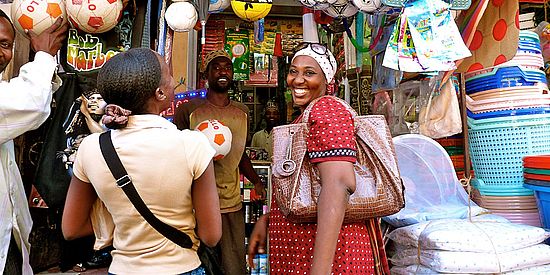

Social Anthropology is the study of human beings in their full diversity. Its goal is to understand social action in different societies, and explain it in terms of its social, political, economic and cultural contexts. In pursuit of this goal, anthropologists deal with both rural and urban spaces. They examine everyday practice, social and religious movements, the functioning of legal systems, conflicts, or the activities of state and international organizations, and explore how local cultures are embedded in regional, national, and global spaces.
While the regional focus of social anthropology at the University of Basel is on Africa and Eastern Europe, our researchers also conduct research and teach on Oceania, Asia, Latin America, and the Afro-Atlantic region, among other areas.
Our research and teaching focus thematically on general anthropology; the global economy; migration, mobility and belonging; gender, sexuality and kinship; medicine, health and the body; and the politics of knowledge production.
From a methodological perspective the program of Social Anthropology represents primarily qualitative and interpretive approaches. In particular, it nurtures the development of methods that can detect current changes under globalization.
At Bachelor’s level, students learn to reimagine and understand society and culture in their political and economic contexts. They are taught the history, theoretical and methodological approaches of Social Anthropology and gain insights into current topics in Social Anthropology .
| Degree | BA in Social Anthropology |
| Type | Degree subject |
| Start date | February, September |
| Credit points | 180 |
| Study structure | The bachelor's degree is the first degree. It comprises a total of 180 credit points (CP). Social Anthropology is studied as one of two degree subjects, each worth 75 CP. In addition, there are free electives (30 CP). One ECTS credit point corresponds to approximately 30 hours of work. |
| Subject combination | In addition to subjects from the Faculty of Humanities and Social Sciences, a second bachelor's degree subject can also be an extra-faculty subject. Students can choose according to their specific interests. Social Anthropology can be combined particularly well with disciplines that deal with societies and their cultures or cultural sub-areas (such as art or language), with human behavior, their norms (law), with their history or their natural environment. The 30 CP for the free electives can be gained in courses of your choice (please check entry requirements of the respective courses). They are usually used to acquire general skills (foreign languages, IT, rhetorics, etc.), interdisciplinary learning (non-subject or interdisciplinary courses), to further deepen one's own subject studies or acquire a certificate. |
| Language of instruction | German, English |
| Subject area | Anthropology |
The Student Administration Office at the University of Basel is responsible for admitting students to bachelor’s programs in the Faculty of Humanities and Social Sciences. This is based on the admission regulations of the President’s Office:
Holders of a Swiss federal Maturität certificate will be admitted to all bachelor’s degree programs.
If you have any further questions, please consult the information provided here.
Students must register for their bachelor’s or master’s degree program within a specified timeframe – even in cases of delayed registration.
The University of Basel organizes regular information events for bachelor’s and master’s programs. Details can be found on the events page of the Faculty of Humanities and Social Sciences.
Some subject areas also offer their own separate information or welcome events. Please consult the page for the relevant subject area for event dates and locations.
Students who have earned 60 CP in the subject to be examined or 120 CP in the degree program and have completed the seminar papers that count towards the degree in the subject to be examined or in the degree program may register for the Bachelor's examination. Proof is provided by submitting the module assignment.
Only one subject per session can now be examined. This means that the two Bachelor's examinations can be spread over two sessions (note: only for subjects - it is not possible to separate the two examinations for degree programs).
BA examinations: Due to the free availability of AI text generators (such as ChatGPT), the Faculty of Phil.-Hist. has decided to adapt the way in which the BA examination is conducted. This adjustment is intended to ensure that students are able to do their own work. From spring semester 2023, the BA examinations will once again be written in the university rooms under supervision. These will be digital "bring-your-own-device" examinations. The examination dates remain unchanged.
Please note the updated information sheet on the procedure for BA examinations and the new registration form (subject, degree program). If you have any questions, please contact the Student Administration.